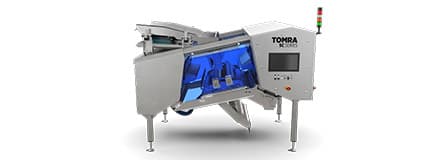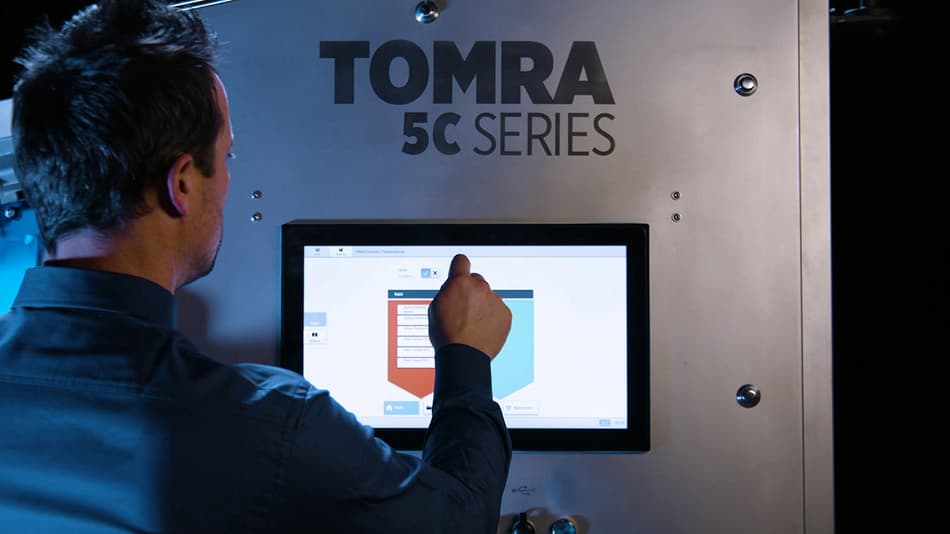Get in touch
Speak with us to learn how you can make Every Resource Count!™
TOMRA Food has launched the TOMRA 5C premium sorting machine, with the company’s unique biometric signature identification technology, for frozen Vegetables. This solution was shown for the first time today at Fruit Logistica Berlin, the world’s leading trade fair for the fresh fruit industry, where visitors to TOMRA’s stand had the opportunity to watch a live online demonstration of the sorter in action at TOMRA’s Test Center in Leuven, Belgium.

By locating the TOMRA 5C on the processing line between the IQF tunnel and the packing station, final checks for food safety and product quality can be made with unrivaled accuracy. As the frozen product reaches the end of the line for bagging, the sorter recognizes and removes any remaining foreign material, extraneous vegetable matter (EVM), and hard-to-detect product defects, such as stems and stalks with green beans and nightshade with peas. These detection capabilities greatly reduce the risks of consumer complaints or product recalls - already a vital requirement, and one that is harder to meet with organically-grown fruit and vegetables, which typically get delivered to processing lines containing more unwanted materials such as insects, rodents, and EVM.
As well as protecting brand reputations, the TOMRA 5C's state-of-the-art technologies deliver other operational advantages. Compared to its highly effective predecessor, the Nimbus BSI, this new machine further enhances sorting efficiency and yields; is easier to keep running in optimum condition; has a more hygienic design which reduces cleaning time by about 35% compared to the Nimbus, and has a capacity that's greater by 5-10%.
The TOMRA 5C was first introduced in 2020 to sort Dried Fruit and Nuts but was designed from the outset for many different applications, including IQF vegetables and fruit. This machine is now being made available for IQF lines following tests with one major IQF Vegetables processor in the USA and another in Europe. Validation was conducted over an intensive six-week period, with the machines working for two or more shifts per day and sorting four to five tons of product every hour. Sorting performance was assessed with more than 20 different types of Vegetables, mono and mixed.
The trials showed consistently excellent results - even with Vegetables that are traditionally difficult to sort, such as white cauliflower, and even when looking for foreign materials that are difficult to detect, such as nightshade mixed in with peas.
The TOMRA 5C's unrivaled sorting accuracy is made possible by combining high-resolution lasers with TOMRA's innovative Biometric Signature Identification (BSI) technology, which means that every object passing down the line is assessed not only for its color and shape, but also biological characteristics. This next-generation spectral imaging is able to look inside materials on the line by identifying their unique biometric characteristics or ‘fingerprint’. BSI clearly contrasts good and bad materials and is able to detect even smaller defects than those recognized by conventional spectral technology.

Efficiency is also improved by connectivity to the cloud-based data platform TOMRA Insight. By accessing live data from the sorter, operators can make almost instant improvements to line efficiencies. When frozen vegetable products are mixed, this facility can ensure that each bag is packed with the right mix. Moreover, accessing data retrospectively makes it possible to quantify the standards of raw materials from suppliers and to make better-informed business decisions.
Keeping the TOMRA 5C running for optimum performance is aided by a Heartbeat feature, which gives one-click information about the machine's health status and automatically triggers alarms if their faults. Cleaning is made easier and uptime is increased by a hygienic machine design with minimal and curved surfaces and easy access. Operation is made easy with the well-proven TOMRA ACT user interface. And this machine has proven in validation that it can withstand the tough conditions found in IQF environments, with an ability to perform well in temperatures as hot as 50°C or as cold as -30°C.
